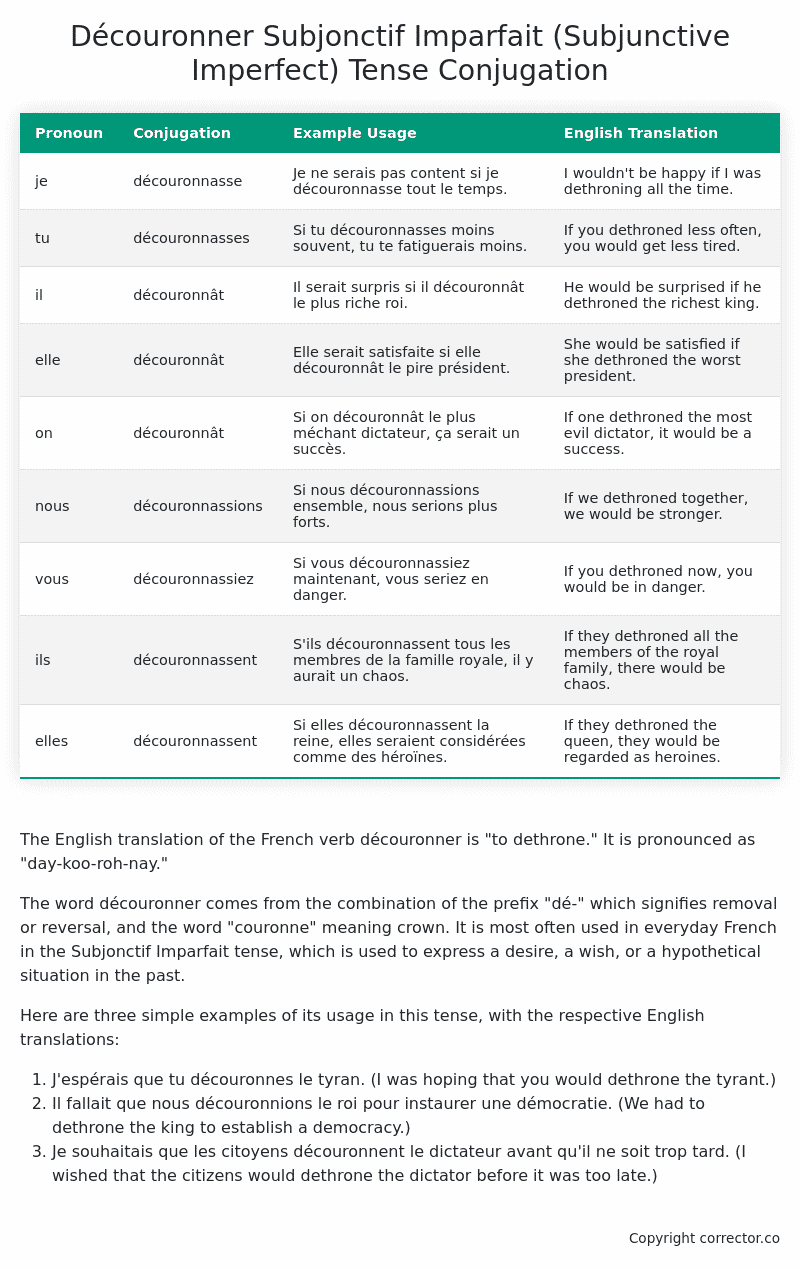Subjonctif Imparfait (Subjunctive Imperfect) Tense Conjugation of the French Verb découronner
Introduction to the verb découronner
The English translation of the French verb découronner is “to dethrone.” It is pronounced as “day-koo-roh-nay.”
The word découronner comes from the combination of the prefix “dé-” which signifies removal or reversal, and the word “couronne” meaning crown. It is most often used in everyday French in the Subjonctif Imparfait tense, which is used to express a desire, a wish, or a hypothetical situation in the past.
Here are three simple examples of its usage in this tense, with the respective English translations:
- J’espérais que tu découronnes le tyran. (I was hoping that you would dethrone the tyrant.)
- Il fallait que nous découronnions le roi pour instaurer une démocratie. (We had to dethrone the king to establish a democracy.)
- Je souhaitais que les citoyens découronnent le dictateur avant qu’il ne soit trop tard. (I wished that the citizens would dethrone the dictator before it was too late.)
Table of the Subjonctif Imparfait (Subjunctive Imperfect) Tense Conjugation of découronner
| Pronoun | Conjugation | Example Usage | English Translation |
|---|---|---|---|
| je | découronnasse | Je ne serais pas content si je découronnasse tout le temps. | I wouldn’t be happy if I was dethroning all the time. |
| tu | découronnasses | Si tu découronnasses moins souvent, tu te fatiguerais moins. | If you dethroned less often, you would get less tired. |
| il | découronnât | Il serait surpris si il découronnât le plus riche roi. | He would be surprised if he dethroned the richest king. |
| elle | découronnât | Elle serait satisfaite si elle découronnât le pire président. | She would be satisfied if she dethroned the worst president. |
| on | découronnât | Si on découronnât le plus méchant dictateur, ça serait un succès. | If one dethroned the most evil dictator, it would be a success. |
| nous | découronnassions | Si nous découronnassions ensemble, nous serions plus forts. | If we dethroned together, we would be stronger. |
| vous | découronnassiez | Si vous découronnassiez maintenant, vous seriez en danger. | If you dethroned now, you would be in danger. |
| ils | découronnassent | S’ils découronnassent tous les membres de la famille royale, il y aurait un chaos. | If they dethroned all the members of the royal family, there would be chaos. |
| elles | découronnassent | Si elles découronnassent la reine, elles seraient considérées comme des héroïnes. | If they dethroned the queen, they would be regarded as heroines. |
Other Conjugations for Découronner.
Le Present (Present Tense) Conjugation of the French Verb découronner
Imparfait (Imperfect) Tense Conjugation of the French Verb découronner
Passé Simple (Simple Past) Tense Conjugation of the French Verb découronner
Passé Composé (Present Perfect) Tense Conjugation of the French Verb découronner
Futur Simple (Simple Future) Tense Conjugation of the French Verb découronner
Futur Proche (Near Future) Tense Conjugation of the French Verb découronner
Plus-que-parfait (Pluperfect) Tense Conjugation of the French Verb découronner
Passé Antérieur (Past Anterior) Tense Conjugation of the French Verb découronner
Futur Antérieur (Future Anterior) Tense Conjugation of the French Verb découronner
Subjonctif Présent (Subjunctive Present) Tense Conjugation of the French Verb découronner
Subjonctif Passé (Subjunctive Past) Tense Conjugation of the French Verb découronner
Subjonctif Imparfait (Subjunctive Imperfect) Tense Conjugation of the French Verb découronner (this article)
Conditionnel Présent (Conditional Present) Tense Conjugation of the French Verb découronner
Conditionnel Passé (Conditional Past) Tense Conjugation of the French Verb découronner
L’impératif Présent (Imperative Present) Tense Conjugation of the French Verb découronner
L’infinitif Présent (Infinitive Present) Tense Conjugation of the French Verb découronner
Struggling with French verbs or the language in general? Why not use our free French Grammar Checker – no registration required!
Get a FREE Download Study Sheet of this Conjugation 🔥
Simply right click the image below, click “save image” and get your free reference for the découronner Subjonctif Imparfait tense conjugation!

Découronner – About the French Subjonctif Imparfait (Subjunctive Imperfect) Tense
Formation
Common Everyday Usage Patterns
Interactions with Other Tenses
Subjonctif Présent
Indicatif Passé Composé
Conditional
Conditional Perfect
Summary
I hope you enjoyed this article on the verb découronner. Still in a learning mood? Check out another TOTALLY random French verb conjugation!


